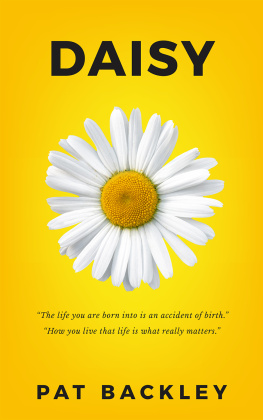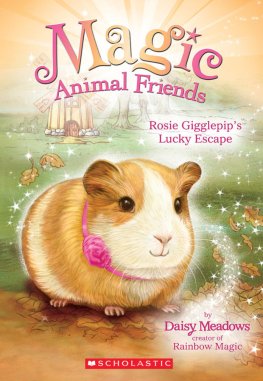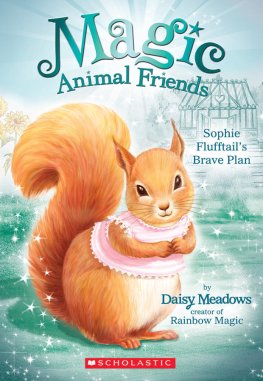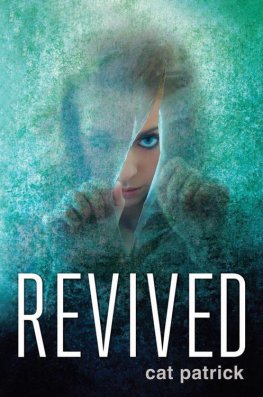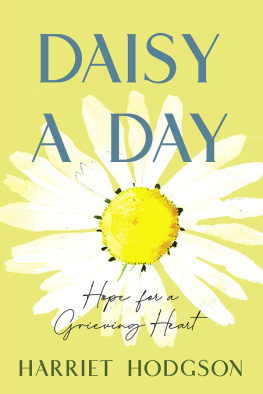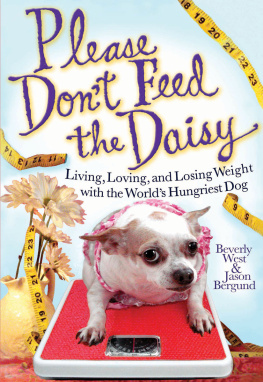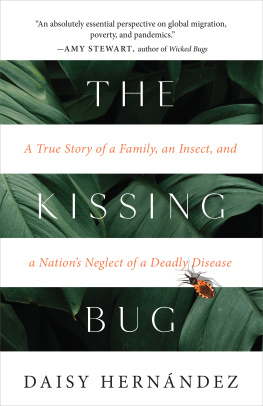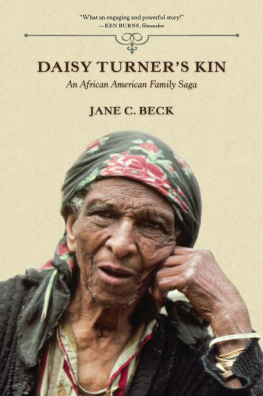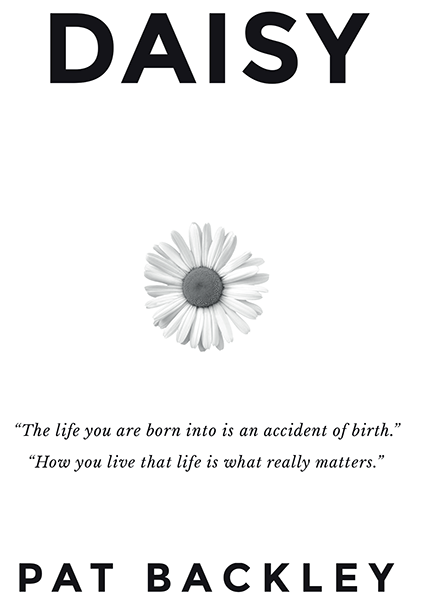
DAISY
Copyright 2020 by P at Backley
All rights reserved.
This book is a work of fiction. Any references to historical events, real people, or real places are used fictitiously. Other names, characters, places, and events are products of the authors imagination and any resemblance to actual events, places, or persons, living or dead, is entirely coi ncidental.
All rights reserved. No part of this publication may be reproduced, distributed, or transmitted in any form or by any means, including photocopying, recording, or other electronic or mechanical methods, without the prior written permission of the publisher, except in the case of brief quotations embodied in critical reviews and certain other commercial uses permitted by copy right law.
P at Backley
www.patb ackley.com
Paperback: ISBN: 978-0-4 73-54038-8
ebook: ISBN: 978-0-4 73-54039-5
Edited by Col leen Ward.
Cover design by Covers.com
Formatting by Formatte dbooks.com

CONTENTS
ACKNOWLEDGMENTS
I would like to thank everybody who has inspired me to write this book, especially my beloved daughter, Lucy. Sometimes, people come into your life for no apparent reason, but they end up leaving their footprints on y our soul.
There have been many people who have influenced me in some way (far too many to mention by name) and they know who they are.
Thank you.

LONDON
1974
T hey sat on the damp grass making dai sy chains.
One large white hand and one small black one, clutching the pretty little flowers.
Mum, why am I call ed Daisy?

ALABAMA
1887
T heobold Cummings was born in 1887, into a life of luxury.
His family had owned their cotton plantation in Alabama for more than a century, each generation passing it down to the next.
At one time, they owned almost one hundred slaves, but now all the workers were free men and women.
Though born into this world of riches, Baby Theobold had three older brothers,so he would never inherit any of his familys success.
He would have to make his mark on the world in an other way.

1887
I ll egitimate .
Unwanted.
Polly sobbed quietly as she looked down at the baby in her arms.
She couldnt bear the thought that anyone would call her beautiful little girl s uch names.
But it was true.
Her little Daisy was a bast ard child.
Now, now girl, stop that whining. You got yourself into this mess, so its no good crying over spil led milk.
The old woman spoke kindly, b ut firmly.
She had seen so many young girls in the same predicament and could offer no real words of comfort. She knew exactly how hard their lives would be, now that they h ad a baby.
And n o husband.
For many years, she had acted as an unofficial midwife in the slums of the East End, helping those poor women who could not afford a prop er doctor.
She had been called to the house in Stepney by her fri end Sybil.
Sybil was a cook at one of the big mansions on the edge of Regents Park, but she always came back to the East End to visit her family on her Sunday after noons off.
The midwife had been surprised when she got the message.
This family wasnt the kind that gave tea parties and she knew that Sybil only ha d nephews.
But the boy who delivered the note had said it w as urgent.
I just thought it would be nice to give her an outing, sob bed Sybil.
I never knew her time was so close, otherwise I wouldnt have done it.
In fact, none of us even knew she was expecting til a few we eks ago.
She hid it very well. Still fit into her uniform and ev erything.
Polly sat on the bed and tried to pretend it wasnt happening.
That it wasnt her they were talk ing about.
Just a few months ago her life had seeme d perfect.
Well, almos t perfect.
If she didnt think about the extra attention.
Polly had been born in the Workhouse.
Her mother had died during childbirth and she never knew if she had any othe r family.
Polly had lived a grim existence, made grimmer by the fact that she was rather beautiful and had a sunny di sposition.
Both of these were qualities that sometimes made other peopl e envious.
She was put to work when she was just six years old, scrubbing the hard concrete floors of the Workhouse. After a couple of years, she had hands like those of an old woman, red and constantly sore. She h ated them.
One day, instead of being on the floor, scrubbing endlessly, she was sent to work in the Laundry. It was then that her lif e changed.
A pile of sheets that were old and well-worn needed mending.
In the Workhouse, you learnt things just by watching others. This is how Polly learned to read and write; while the children were supposed to have proper lessons, they were only invited in the schoolroom when rich benefactors were visiting. The rest of the time they were treated like slaves, worked to the bone to earn their bed and board. Because of this, any skills came from ob servation.
Polly was smart, as well as beautiful, and despite her limited opportunities, she was determined to create a better life for herself. Occasionally, she would sneak books from the schoolroom to read by candlelight after the other girls had gone to sleep. While it took her a long time to be able to read and write, by the age of 10, Polly was able to read simple sentences and write her own name.
In much the same way the children got their education, Polly knew how to sew from watching others do it in the W orkhouse.
The day Polly was sent to the laundry, she realised she had found a way out.
A way out of the Workhouse an d poverty.
Well, obviously not for a few years she thou ght aloud.
I am still only small, but one day I will escape all this and becom e a lady.
That first day in the laundry, Polly recognized she was good a t sewing.
Not just capable like some of the other girls, but good. Re ally good.
She excelled at creating the tiniest little stitches that were just about invisible to the n aked eye.
And best of all, she loved doing it.
Course, I suppose its in her blood. Her mother was a wonder with a needle.
Polly was thrilled. She had never heard anyone talk about her mother like that.
Did you know my mother? she asked the old woman who h ad spoken.
Of course. Everyone knew her.
She was already expecting you when she came here, great big belly she had, and was half dead with cold and hunger. But very beautiful, like you, and so good with a needle. The master got her doing all the fa ncy work.
From that day on, Polly was determined to be the best seamstress ever, as good as her mother had been.
And so successful was she, that when she was just eleven years old she was sent out from the Workhouse. To go into service as a junior sewing maid in a big house on Cornwall Terrace, on the southwest corner of Reg ents Park.
She had been so happy.
In the new house, the other servants had taken the little girl under the ir wings.
She spent hours in her little room in the basement, next to the kitchen, sewing beautiful dresses for the mistress of the house.
Sybil, the cook, had shown Polly great kindness from the very first day she had arrived at the big house, a skinny and frightened child, straight from the Workhouse.
Next page
